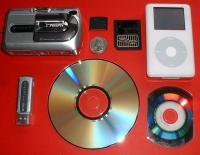-
WhatsApp to add encryption to voice chats

Reports say that WhatsApp is planning to add encrypted video chats to its app in order to make it impossible for, so that nobody could snoop on its users. Adding encrypted voice chats will mean that all of the messages that pass through WhatsApp will be secure. Text messages are already encrypted.
-
-
Identifying national security threats posed by everyday commercial technologies

For decades, U.S. national security was ensured in large part by a simple advantage: a near-monopoly on access to the most advanced technologies. Increasingly, however, off-the-shelf equipment developed for the transportation, construction, agricultural, and other commercial sectors features highly sophisticated components, which resourceful adversaries can modify or combine to create novel and unanticipated security threats. DARPA’s “Improv” effort asks the innovation community to identify commercial products and processes that could yield unanticipated threats.
-
-
How organizations can secure their teleworkers, data
As the number of employees who telework trends upward — and new kinds of devices are used in telework — the National Institute of Standards and Technology (NIST) says it is updating its guidance to include the latest technology available to strengthen an organization’s remote-access data security.
-
-
Snowden dismisses FBI's claim it cannot unlock San Bernardino killers’ iPhone

Edward Snowden has joined the debate over the FBI’s attempt to force Apple to help it unlock the iPhone 5C used by one of the San Bernardino terrorists. The FBI says that only Apple can deactivate certain passcode protections on the iPhone — for example, the 10-attempt limit, which makes the phone permanently inaccessible after ten attempts to guess the password —which would allow law enforcement to guess the passcode by using brute-force.
-
-
The staggering cost of war to Syria, neighbors

A new report evaluates the economic losses to Syria, Lebanon, Jordan, and Turkey to date and into the future. The report concludes that the cost of conflict to Syria is an estimated $275 billion in lost growth opportunities. If the conflict continues to 2020, the cost of conflict to Syria will be $1.3 trillion.
-
-
Calif. terrorists’ iPhone may have been used to introduce malware into data networks: DA

San Bernardino County District Attorney Michael Ramos has advanced what experts describe as an unusual reason for forcing Apple to allow the FBI to break the password of the iPhone used by the two terrorists as part of the agency’s investigation of the attack. Ramos says the phone might have been “used as a weapon” to introduce malicious software to county computer systems.
-
-
2014 French nuclear accident more serious than official reports suggested

German media charges that the French nuclear authority and the French company operating the aging Fessenheim nuclear facility in France, concealed the seriousness of the April 2014 incident at the site. The French nuclear authorities withheld information not only from the German government, but also from the IAEA, to which they were required to submit a detailed report about the incident.
-
-
French law would penalize encrypted phone makers who refuse to help police probes
French lawmakers on Thursday voted for a measure which would impose penalties on manufacturers of smartphone who refuse to cooperate with law enforcement in inquiries of terrorism cases. The measure stipulates that a private manufacturer of smartphones, which refuses to hand over encrypted data to an investigating authority, would face up to five years in jail and a 350,000 euro ($380,000) fine.
-
-
Apple versus FBI: All Writs Act’s age should not bar its use
A federal magistrate judge in California has issued a warrant ordering Apple to assist the FBI in accessing data on an iPhone used by a suspect in the December 2015 San Bernardino mass shooting. Apple’s public refusal to comply with the order – and its motion asking a judge to reverse the order – have set up a legal showdown that has captivated the technology world. It’s hard not to think that marketing and economics are at least somewhat behind Apple’s actions. But my guess is most people understand that the FBI would not be getting into their phones without a probable cause search warrant. In addition, I would think Apple would not want to have a market composed of people who want to use iPhones for dangerous and illegal activity. The company might actually lose more future customers because of its uncooperative attitude than it would ever lose by helping the government by complying with a court order.
-
-
Candidates' plans to change controversial H-1B guest worker program highlight need for an overhaul
Since its inception in 1990, the H-1B guest worker program that allows employers to bring in high-skilled foreign workers on six-year visas has been steeped in controversy. Critics accuse it of depressing wages and outsourcing American jobs, while advocates call it an essential source of the best and brightest talent. The H-1B program is an important program that serves as a bridge to permanent immigration for talented foreign workers. It should be used to recruit truly specialized workers from abroad when the labor conditions are tight and a qualified American can’t be found. But no American worker should ever be displaced by an H-1B worker – that was never the program’s intent – and this practice should be ended.
-
-
FBI cannot force Apple to unlock iPhone in drug case: Judge
Magistrate Judge James Orenstein in Brooklyn on Monday ruled that the U.S. government cannot force Apple to unlock an iPhone in a New York drug case. The ruling strengthens the company’s arguments in its landmark legal confrontation with the Justice Department over encryption and privacy. The government sought access to the drug dealer’s phone months before a California judge ordered Apple to give access to the San Bernardino terrorist’s handset.
-
-
In FBI versus Apple, government strengthened tech’s hand on privacy
The ongoing fight between Apple and the FBI over breaking into the iPhone maker’s encryption system to access a person’s data is becoming an increasingly challenging legal issue. This case is very specific, and in this narrow case, Apple and law enforcement agencies will likely find a compromise. However, this question is not going away anywhere. With the “Internet of things” touted as the next big revolution, more and more devices will capture our very personal data – including our conversations. This case could be a precedent-setting event that can reshape how our data are stored and managed in the future.
-
-
Hackers hold hospitals’ medical data hostage
Hackers attacked several hospitals in Germany with ransomware – locking medical files and demanding ransom payment for releasing the encrypted data. The blackmailing of hospitals by encrypting their medical file has become a growing problem around the world. In California, for example, a Hollywood hospital earlier this month had to pay about $17,000 in the digital currency bitcoins to hackers in order to regain access to medical files.
-
-
More Americans support Justice Dept. than Apple in locked iPhone dispute
As the standoff between the Department of Justice and Apple Inc. continues over an iPhone used by one of the suspects in the San Bernardino terrorist attacks, 51 percent say Apple should unlock the iPhone to assist the ongoing FBI investigation. Fewer Americans (38 percent) say Apple should not unlock the phone to ensure the security of its other users’ information; 11 percent do not offer an opinion on the question.
-
-
Passwords, privacy and protection: can Apple meet FBI’s demand without creating a ‘backdoor’?
The point of encryption is to make decryption hard. However, hard does not mean impossible. The FBI could decrypt this data, with sufficient effort and computational power, and they could do this with no help from Apple. However, this route would be expensive, and would take some time. In effect, what they’re requesting of Apple is to make their job easier, cheaper and faster. Ultimately, how this matter gets resolved may depend more on the big-picture question of what privacy rights we as a society want for the data we record on our personal devices. Understanding the technical questions can inform this discussion.
-
- All
- Regional
- Water
- Biometrics
- Borders/Immig
- Business
- Cybersecurity
- Detection
- Disasters
- Government
- Infrastructure
- International
- Public health
- Public Safety
- Communication interoperabillity
- Emergency services
- Emergency medical services
- Fire
- First response
- IEDs
- Law Enforcement
- Law Enforcement Technology
- Military technology
- Nonlethal weapons
- Nuclear weapons
- Personal protection equipment
- Police
- Notification /alert systems
- Situational awareness
- Weapons systems
- Sci-Tech
- Sector Reports
- Surveillance
- Transportation
Advertising & Marketing: advertise@newswirepubs.com
Editorial: editor@newswirepubs.com
General: info@newswirepubs.com
2010-2011 © News Wire Publications, LLC News Wire Publications, LLC
220 Old Country Road | Suite 200 | Mineola | New York | 11501
Permissions and Policies
Editorial: editor@newswirepubs.com
General: info@newswirepubs.com
2010-2011 © News Wire Publications, LLC News Wire Publications, LLC
220 Old Country Road | Suite 200 | Mineola | New York | 11501
Permissions and Policies
